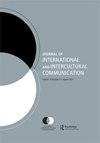On the Horizon: Desiring Global Queer and Trans* Studies in International and Intercultural Communication
IF 2.2
Q2 COMMUNICATION
Journal of International and Intercultural Communication
Pub Date : 2021-10-02
DOI:10.1080/17513057.2021.1967684
引用次数: 3
Abstract
***** Throughout my U.S.-based undergraduate and graduate trainings between 2001 and 2011, I did not feel fully at home majoring in “Intercultural Communication.” Topics such as intercultural transition; identity negotiation and relationships; language and performance; nonverbal codes and cultural spaces; migration and citizenship; and globalization and popular culture, represented my lived experiences of being an international student from Japan, who every day navigates the politics of difference in USAmerica. However, I always questioned and, quite frankly, did not understand why the field of Intercultural Communication had overlooked queer issues and concerns of sexuality, sex, and gender in its knowledge productions. As I live my queer of color life, I can neither easily separate nor conveniently compartmentalize intersectional, multidimensional aspects of who I am, what I do, and how I make sense of what I do in relation to people around me. My sexuality, sex, and gender are central to my cultural identities and orientations. Hence, bringing the personal to the political, I developed a love-hate relationship with Intercultural Communication. However, my love-hate relationship with Intercultural Communication began to change when Chávez (2013) called for Queer Intercultural Communication to be published in this very journal. She explicitly opened up possibilities for disrupting the unspoken and unwritten circumferences of Intercultural Communication that privileged the logic of cisheterosexuality working with whiteness, patriarchy, capitalism, and more. Chávez (2013) stated, “Within what is recognizable as [I]ntercultural [C]ommunication scholarship, [Q]ueer studies have been marginal... In this very journal, a search of all available issues reveals no mention of queer or transgender on its pages” (p. 84). Thus, Chávez’s call made space to showcase possibilities of what Queer Intercultural在地平线上:渴望全球酷儿和跨文化研究在国际和跨文化交际
*****在2001年至2011年期间,我在美国接受本科和研究生培训,主修“跨文化交际”并没有让我感到完全自在。跨文化转型等主题;身份协商与关系;语言和表演;非语言代码与文化空间;移民和公民身份;全球化和流行文化,代表了我作为一名来自日本的国际学生的生活经历,我每天都在美国的政治差异中航行。然而,我总是质疑,坦率地说,我不明白为什么跨文化交际领域在其知识生产中忽视了酷儿问题和性、性和性别的关注。当我过着有色酷儿的生活时,我既不能轻易分离,也不能方便地划分我是谁,我做什么,以及我如何理解我所做的事情与周围人的关系等交叉的、多维的方面。我的性取向、性和性别是我的文化认同和取向的核心。因此,从个人到政治,我对跨文化交际产生了一种爱恨交织的关系。然而,当Chávez(2013)呼吁在这本杂志上发表《酷儿跨文化传播》时,我对跨文化传播又爱又恨的关系开始发生变化。她明确地开辟了打破跨文化交流的潜规则和潜规则的可能性,这种潜规则赋予了异性恋者与白人、父权制、资本主义等合作的特权。Chávez(2013)指出,“在公认的[I]跨文化[C]传播学术中,[Q]同性恋研究一直处于边缘地位……在这本杂志中,搜索所有可用的问题,在其页面上没有提到酷儿或变性人”(第84页)。因此,Chávez的呼吁为展示酷儿跨文化的可能性提供了空间
本文章由计算机程序翻译,如有差异,请以英文原文为准。
求助全文
约1分钟内获得全文
求助全文
来源期刊

Journal of International and Intercultural Communication
COMMUNICATION-
CiteScore
3.80
自引率
12.50%
发文量
19
 求助内容:
求助内容: 应助结果提醒方式:
应助结果提醒方式:


